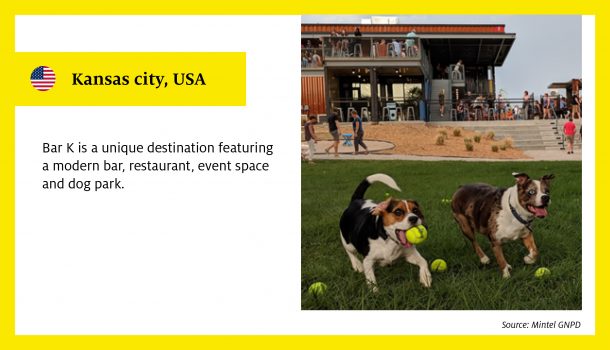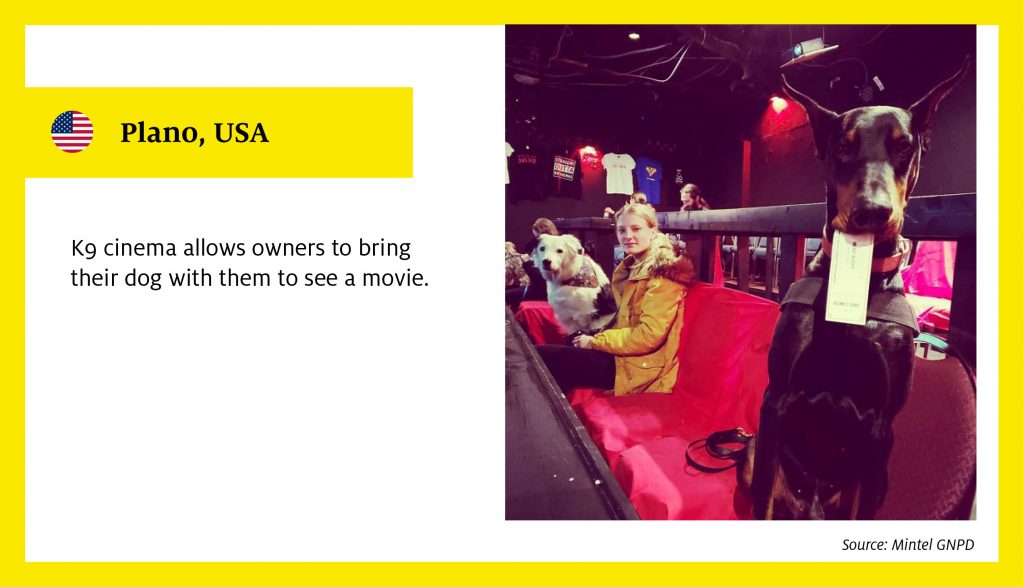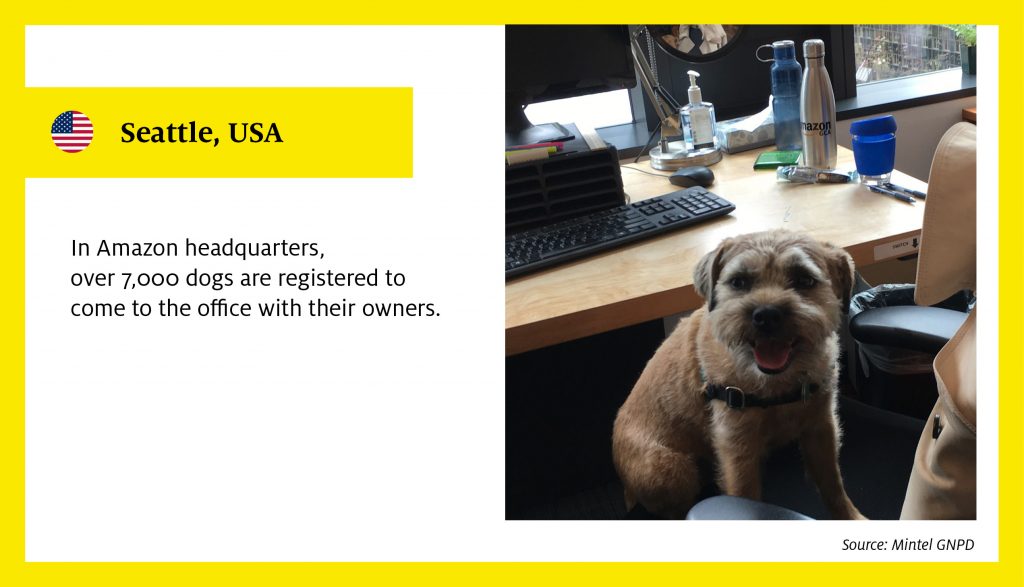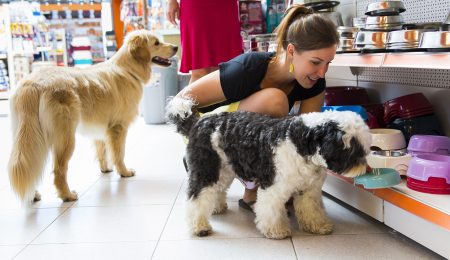Hence, leisure venues that are pet-friendly are broadening their market, especially as many pet owners like to eat at the same time as their pets.
Pet food brands are expected to make emotional connections to pet owners by offering more flexible products and services to accommodate and entertain their furry companions.
Foodservice embracing pet-friendly initiatives
For foodservice operators, there is much scope to tap into consumer desire to pamper their pets. A number of dining concepts and services that cater to pets as much as their owners have already sprung up in urban centres in recent years, such as a Dine With Your Dog Brunch offered by the London restaurant chain M Restaurant.
Many operators are targeting pet owners who like to socialise with their animals. Dogs in London can drink beer at the Pet Pavilion while in the US, Burger King offered dogs a flame-grilled bone when their humans ordered via DoorDash. Two Starbucks locations in China are welcoming customers to bring along their pets for a cup of coffee.
While it can still be challenging to find pet-friendly retailers and foodservices, they are steadily growing in number, both in China and abroad. For example, in Argentina, Royal Canin teamed up with restaurant chain Le Blé to organise a game that invited owners and their pets to search for a pet-friendly mystery Le Blé outlet.
Some restaurants, especially in Texas, are even starting to open within dog parks. Kansas City is also home to a dog park restaurant called Bar K that exists squarely within a two-acre dog park. Bar K goes beyond just being a dog park and hosts tailored events and features in-house grooming services. Several of the dog park restaurants host various events, which also include “adopt-athon” events.
But companies need to be very wary of not actively putting off (non-pet owners) customers in their efforts to cater for pet owners. Having special dog dining events, or specific times just for pet owners and their pets if there is sufficient demand, is likely to be more popular than making them a permanent state of play.
The leisure industry can also build on being pet-friendly
37% of UK pet owners would be interested in pet-friendly leisure activities (eg a dog-friendly cinema). Brands from a variety of sectors are catering to the world’s devoted pet lovers. We have seen hotels, airlines and beaches ensuring pets are welcome and well looked after. Holidays can pose a conundrum for pet owners. Taking pets away with them is the preferred option for dog owners, with 58% of UK pet owners basing their choice of holiday around their pet.
Seoul’s Nowon District has announced that it will open a pet lounge over the Lunar New Year holiday for families who have to leave their pets behind. Shinsegae Chosun Hotel Group (South Korea) has launched its first urban French-style boutique hotel brand L’Escape in Seoul, with an exclusive floor for guests with pets, while the village of Gümüşlük in Bodrum, Turkey, is opening a pet-friendly beach.
The airlines industry is also adapting its offer with Emirates launching a new pet flight service to provide a more convenient and stress-free experience for pets and owners alike. In Mexico there is even a dedicated city tour just for dogs, led by a dog handler and with special activities for pets.
And just like Mexico City, many others metropolises are becoming more receptive in order to provide urban dwellers with more flexible transportation services that welcome furry companions. In London, financial brand MORE TH>N organised a 90-minute bus tour for dogs and their owners, while the government of Buenos Aires has made it legal to take pets on the city’s subway.
A theatre in Plano, Texas allows pet owners to bring their dog with them to see a movie. The new theatre, known as K9 Cinemas, doesn’t just allow dogs; it’s designed around them. Consumers love their pets, and they’re increasingly feeling an associated guilt when they are left at home, as evidenced by half of pet owners saying they worry about their pet when they’re away.
That guilt is leading pet owners to bring their pups with them whenever and wherever they can, whether it’s a bar/restaurant or even work (see below).
However, as much as consumers want to treat their dogs like children, they’re still animals, which means there are limits to what can be offered. Emotional support animals have become a common issue for paw-friendly leisure industry, with consumers taking dogs of all sizes and training levels on flights or beaches.
Pets in the workplace are widely seen to improve job satisfaction
The ability for the feel-good element of pets to radiate outwards and have a positive impact on a much wider audience than just owners is at the heart of allowing pets into the workplace.
The potential benefits here are tangible for plenty of people, with 45% of UK pet owners agreeing that having pets in the workplace can make it a better place to work. Pets have always been allowed in the office of pet charity Blue Cross, which was founded in 1897. Some of the biggest operators in pet food are also practising what they preach in this respect.
Mars Petcare, for example, began allowing workers to bring pets into the office in 2008, followed by Nestlé in late 2014. The latter company has taken a further stance by making pets in the workplace one of the 10 commitments within its ‘Better with Pets’ campaign, launched in July 2016.
More recently, Amazon’s Seattle HQ has received the title of the most dog-friendly office in the US. Within the Amazon headquarters, over 7,000 dogs are registered to come to the office. The company also features an on-campus dog park, dog daycare during meetings, and plenty of treats and poop bags throughout the campus.
While Amazon clearly has more resources than the average company to cater to dogs, there is a growing movement for dogs to be invited into the office, not just for employees’ convenience, but also for overall office wellbeing.
Dogs are increasingly being cited as a source of stress relief. There are certainly condition that has to be considered for every company, such as allergies, aggressiveness and various other factors, but companies have to start thinking about what benefits they can offer pet owners in and out of the office.
Office culture is no longer tied to the same corporate structure it was once known for. As more employees work remotely and seek better work/life balance as an important component of their job, companies need to consistently think about what elements of an individual’s personal life can be blended into the office.
What can we expect in the future?
The best opportunities for businesses are to either create designated dog-friendly spaces that are separated off from consumers who might not want to share a meal or drink with a pup, or, similar to K9 Cinemas, create new services that redefine traditional activities specifically for pet owners.
Consumers consider their pets as part of their family and for some even like a child, so brands can provide a range of pet-friendly products and services. We will see more venues turning pet-friendly and more innovation in human activities being turned into those suitable for dogs or cats. Dog yoga already exists so the next step would be gyms especially for pets. TV programmes just for cats or dogs are likely to be the next development after books.
A wide range of options could be considered to introduce these little creatures into consumers’ leisure time. A pet-friendly nightclub with cocktails suitable for animals could be created. A pet-friendly theme park could open that allows our four-legged friends to take part.
When it comes to bigger life events, pets are an important consideration. We have seen that Millennials are more commonly prioritising pet needs when buying a home. This resonates well with suggestions for furniture, kitchen appliances or gardens especially for pets.
We have also seen solutions involving technology, like PETROM, an air conditioning and heating system that automatically maintains an optimum temperature for pets. The pet market could explore further technology innovations to offer pets the dream life, at home or on holiday.
Take-home points
- Pet-friendly initiatives are being embraced by all types of industries from leisure to foodservice and workplaces.
- Pet food brands are expected to make emotional connections to pet owners by offering more flexible products and services to accommodate and entertain their furry companions.
- The pet market is likely to explore further technology innovations to offer pets the dream life, at home or on holiday.









* required fields